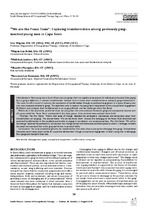| dc.contributor.author | Wegner, Lisa | |
| dc.contributor.author | Brink, Megan Lee | |
| dc.contributor.author | Jonkers, Maliekah | |
| dc.contributor.author | Henn, Rita | |
| dc.contributor.author | Mampies, Shandre | |
| dc.contributor.author | Stemmet, Roxanne Lee | |
| dc.date.accessioned | 2018-08-15T10:00:51Z | |
| dc.date.available | 2018-08-15T10:00:51Z | |
| dc.date.issued | 2018 | |
| dc.identifier.citation | Wegner, L. et al. (2018). “We are the Peace Team”: Exploring transformation among previously gang involved young men in Cape Town. South African Journal of Occupational Therapy, 48(2): 34 - 40. | en_US |
| dc.identifier.issn | 0038-2337 | |
| dc.identifier.uri | http://dx.doi.org/10.17159/23103833/2018/vol48n2a6 | |
| dc.identifier.uri | http://hdl.handle.net/10566/3942 | |
| dc.description.abstract | INTRODUCTION: Many young men in South Africa belong to gangs which has negative consequences for individuals and society. Disengaging
from a gang is difficult as it requires transformation; however, little is known about transformation in previously gang-involved youth.
This study therefore aimed at exploring the experiences of transformation through occupational engagement in a group of young men
who were previously involved in gangs. The objectives were to explore the young men’s experiences of how occupational engagement
facilitated, and sustained, their transformation to an ex-gang lifestyle, and the challenges which they faced.
METHODS: In this descriptive, qualitative study, ten young men who were previously involved in gangs and subsequently became part
of a group called the “Peace Team” participated in four focus groups. Data obtained were analysed thematically.
FINDINGS: The first theme “There’s that sense of change” depicted the participants’ experiences and perceptions about their
transformation out of gangs. The second theme “We are the Peace Team” showed that belonging to the Peace Team facilitated and
sustained transformation as this provided opportunities to engage in non-deviant, pro-social occupations. The third theme “We will be
the change” depicted the participants’ perceptions that change started with themselves and then spread to others. Challenges included
the social and emotional ties to the gang and threats to personal safety.
CONCLUSION: The study provided insight into the transformation that takes place as young men disengage from gangs. Occupational
therapists could create opportunities for supportive development through occupational engagement to assist young men to disengage
from gangs and transform their lives. | en_US |
| dc.language.iso | en | en_US |
| dc.publisher | Occupational Therapy Association of South Africa | en_US |
| dc.rights | This article is licensed under Creative Commons License 4.0 | |
| dc.subject | Disengagement | en_US |
| dc.subject | Gangs | en_US |
| dc.subject | Occupational engagement | en_US |
| dc.subject | Transformation | en_US |
| dc.subject | Young men | en_US |
| dc.title | “We are the Peace Team”: Exploring transformation among previously gang involved young men in Cape Town | en_US |
| dc.type | Article | en_US |
| dc.privacy.showsubmitter | FALSE | |
| dc.status.ispeerreviewed | TRUE | |

